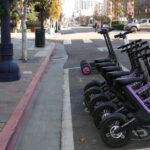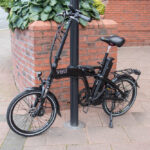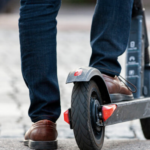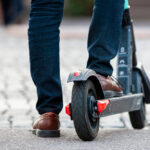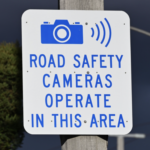Food Delivery Riders Face Fines for Not Wearing High-Visibility Vests
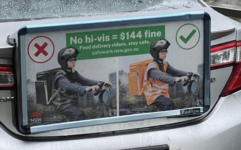
It seems that as each year goes by, more and more rules come into effect regulating our everyday lives, ostensibly for our own protection but increasingly making it harder to go about our business without finding ourselves in the wrong side of the law, facing fines and even in some cases the possibility of being unable to work or coming before the courts.
Traffic laws for food delivery providers and riders
One of many traffic laws be enacted recently in New South Wales is the Work Health and Safety Amendment (Food Delivery Riders) Regulation 2022, which inserts a number of new sections into the Work Health and Safety Act 2011.
The laws, which came into effect on 1 January 2023, require all food delivery platforms such as Uber Eats, Menulog and Doordash to provide riders with:
- Induction training on safety,
- A training record verifying the successful completion of that training, and
- Personal protective equipment including a high-visibility vest and a similarly high-visibility container for food that is made of industry-standard compliant materials.
Food delivery platforms must also keep records of the training provided to each rider, including its date and content.
A food delivery platform is defined as a business established primarily to provide an online platformed designed to engage food delivery riders to deliver food or drink to users of the online platform.
The definition does not include encompass food businesses such as restaurants, take-away shops and other retail stores themselves.
Individuals who breach these requirements will face fines of up to 70 penalty units – which is currently equivalent to $7,700 – and companies will face up to 345 penalty units, or $37,950.
The laws also require those who are engaged by a food delivery booking provider and are delivering food or drink on a bicycle or motorbike to:
- Wear a high-visibility vest and use an industry standard food container, and
- Produce their training record if requested by a SafeWork NSW Inspector or police officer.
The maximum penalty for breaching these rules is 15 penalty units, or $1650 for an individual.
However, this penalty only applies if the matter goes before a court, such as where a rider elects (chooses) to contest the penalty notice and have the case determined in court, and is found guilty of the offence.
The fine is otherwise the amount specified by the penalty notice, which is currently $144.
Safety first
The New South Wales government says the new rules are required as a result of the increasing number of injuries involving food delivery riders in recent years.
In that regard, SafeWork NSW reported 45 incidents involving food delivery riders from 1 April 2021 to 31 March 2022 – 56% involving motorbikes, 29% e-Bikes and 7.5 % bicycles.
And while the new rules currently apply only to those who make deliveries using bicycles and motorcycles, there are proposals to expand them to include all motorcycle riders who are on learner licences – as indeed is the case down south in Victoria.
Changes to eBike safety laws
The New South Wales Government also recently made changes to laws relating to e-Bikes.
There are only two types of permitted e-bikes in NSW:
- Power-assisted pedal cycles – power up to 200 watts.
- Electrically power-assisted cycles – maximum power of up to 500 watts.
Petrol-powered bicycles are prohibited in NSW roads and road-related areas including footpaths, shared paths, cycleways, and bike paths.
The primary reason for this is that the maximum speed limit under the law allowed on NSW Roads is 25km/h. Even if you purchase a bike that can do more than this speed, you must stick to the limit while on the road.
You do not need a license for an e-Bike, and it does not have to be registered.
The road rules for e-Bikes are similar to those for cyclists.
Bright clothing, colourful helmets and Hi-Vis gear are all recommended, but not mandated under the law.
Helmets
Helmets are required and must meet the standards for safety. The maximum penalty a court can impose for the offence is 20 penalty units, which amounts to $2200, but most cases are dealt with by way of ‘on-the-spot’ fines in the sum of $344.
Only children under the age of 16 can ride on a footpath, but they must give provide a metre to pedestrians when passing.
Footpaths and pedestrians
Adults supervising small children learning to ride, can ride on footpaths, but must be aware that pedestrians have right of way.
E-Bike riders should also be aware that many e-Bikes don’t make a lot of noise, if pedestrians are walking together, talking, or walking with headphones in, they might not be aware there is a bike around.
General road safety for eBikes
- When riding side-by-side with another bike, the distance between both bikes must not be more than 1.5 metres apart.
- e-Bike riders are expected to use the dedicated bike lane, unless it’s impractical to do so.
- e-Bike riders must use a hand signal when turning or changing lanes or position on the road. Must not ride on a pedestrian crossing – walk the bike across.
- Must not hold onto another moving vehicle.
- Keep left at all times.
- Must not carry passengers, unless the bike is designed for this purpose with appropriate safety fittings in place.
- eBike riders cannot run red lights, and must always drive with due care. Failing to do so can result in a fine of $425.
Can I have a mobile phone on my eBike or bicycle?
Mobile phones Mobile Phones are permitted on e-Bikes and cycles so long as they are in a phone cradle manufactured to Australian standards and are used hands-free. Riders are not permitted to text, video call, use email, take photos, etc. Doing so can result in a fine that is currently $349, or $464 if you’re caught in a school zone.
Of course, using a phone while driving can be a serious distraction – and a major cause of accidents so bike riders are required to use sense and not keep the audio too loud as it can also block out the noise of other important things happening in the surroundings.



